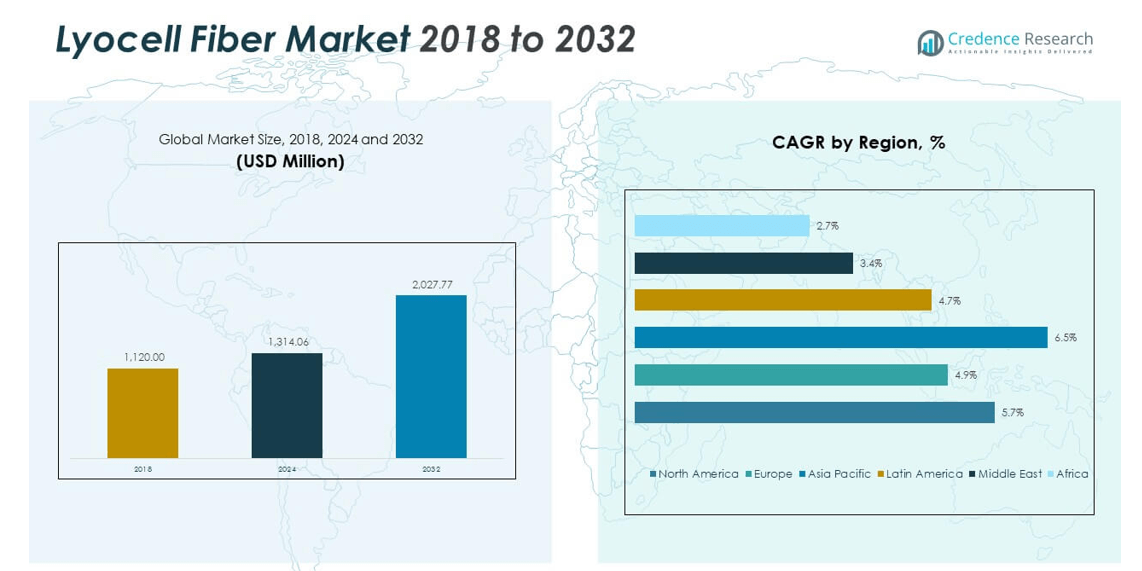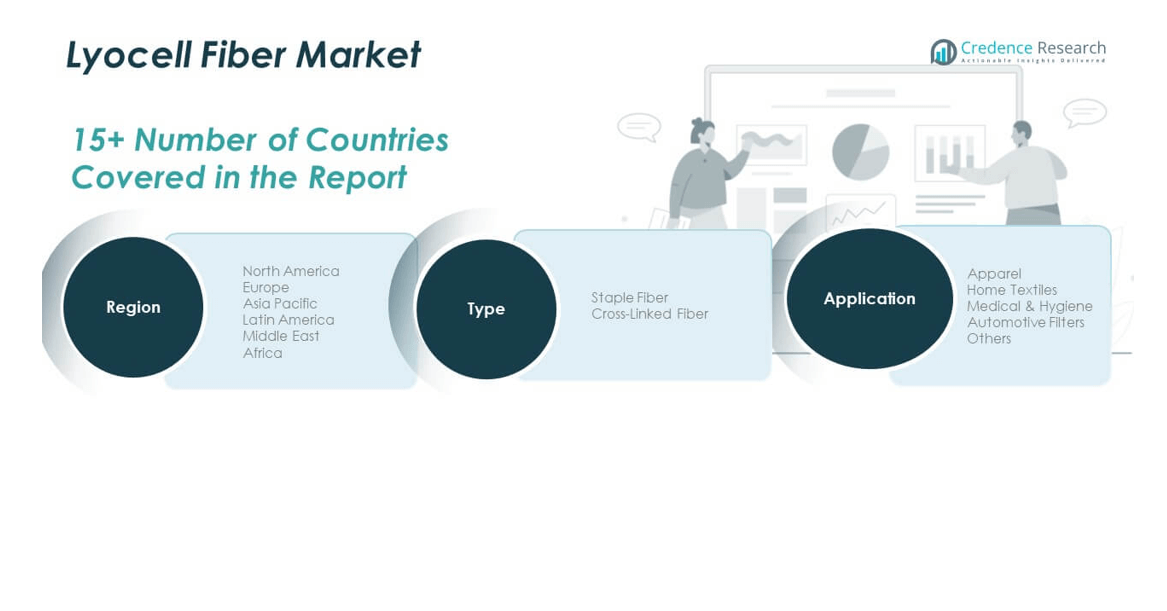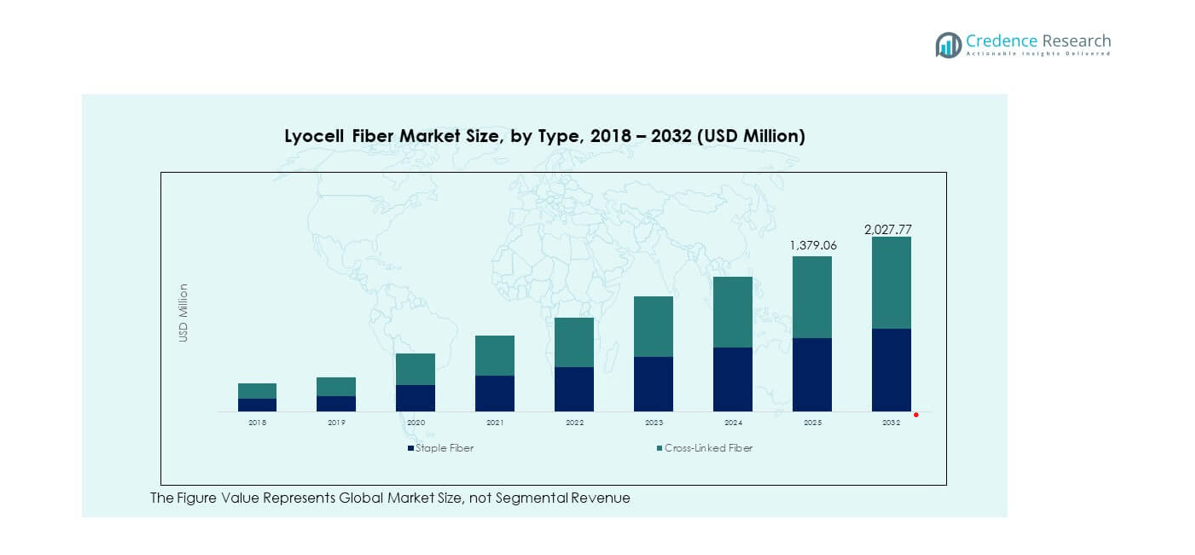CHAPTER NO. 1 : INTRODUCTION 24
1.1. Report Description 24
Purpose of the Report 24
USP & Key Offerings 24
1.2. Key Benefits for Stakeholders 25
1.3. Target Audience 25
CHAPTER NO. 2 : EXECUTIVE SUMMARY 26
CHAPTER NO. 3 : LYOCELL FIBER MARKET FORCES & INDUSTRY PULSE 28
3.1. Foundations of Change – Market Overview 28
3.2. Catalysts of Expansion – Key Market Drivers 30
3.2.1. Momentum Boosters – Growth Triggers 31
3.2.2. Innovation Fuel – Disruptive Technologies 31
3.3. Headwinds & Crosswinds – Market Restraints 32
3.3.1. Regulatory Tides – Compliance Challenges 33
3.3.2. Economic Frictions – Inflationary Pressures 33
3.4. Untapped Horizons – Growth Potential & Opportunities and Strategic Navigation – Industry Frameworks 34
3.5. Market Equilibrium – Porter’s Five Forces 35
3.6. Ecosystem Dynamics – Value Chain Analysis 37
3.7. Macro Forces – PESTEL Breakdown 39
CHAPTER NO. 4 : COMPETITION ANALYSIS 41
4.1. Company Market Share Analysis 41
4.1.1. Global Lyocell Fiber Market Company Revenue Market Share 41
4.2. Strategic Developments 43
4.2.1. Acquisitions & Mergers 43
4.2.2. New Deployment Mode Launch 44
4.2.3. Agreements & Collaborations 45
4.3. Competitive Dashboard 46
4.4. Company Assessment Metrics, 2024 47
CHAPTER NO. 5 : GLOBAL MARKET ANALYSIS, INSIGHTS & FORECAST, BY TYPE 48
CHAPTER NO. 6 : GLOBAL MARKET ANALYSIS, INSIGHTS & FORECAST, BY APPLICATION 52
CHAPTER NO. 7 : GLOBAL MARKET ANALYSIS, INSIGHTS & FORECAST, BY REGION 56
CHAPTER NO. 8 : NORTH AMERICA MARKET ANALYSIS, INSIGHTS & FORECAST, BY COUNTRY 61
8.1. North America Market Analysis, Insights & Forecast, by Type 63
8.2. North America Market Analysis, Insights & Forecast, by Application 64
CHAPTER NO. 9 : EUROPE MARKET ANALYSIS, INSIGHTS & FORECAST, BY COUNTRY 65
9.1. Europe Market Analysis, Insights & Forecast, by Type 68
9.2. Europe Market Analysis, Insights & Forecast, by Application 69
CHAPTER NO. 10 : ASIA PACIFIC MARKET ANALYSIS, INSIGHTS & FORECAST, BY COUNTRY 70
10.1. Asia Pacific Market Analysis, Insights & Forecast, by Type 73
10.2. Asia Pacific Market Analysis, Insights & Forecast, by Application 74
CHAPTER NO. 11 : LATIN AMERICA MARKET ANALYSIS, INSIGHTS & FORECAST, BY COUNTRY 75
11.1. Latin America Market Analysis, Insights & Forecast, by Type 78
11.2. Latin America Market Analysis, Insights & Forecast, by Application 79
CHAPTER NO. 12 : MIDDLE EAST MARKET ANALYSIS, INSIGHTS & FORECAST, BY COUNTRY 80
12.1. Middle East Market Analysis, Insights & Forecast, by Type 83
12.2. Middle East Market Analysis, Insights & Forecast, by Application 84
CHAPTER NO. 13 : AFRICA MARKET ANALYSIS, INSIGHTS & FORECAST, BY COUNTRY 85
13.1. Africa Market Analysis, Insights & Forecast, by Type 88
13.2. Africa Market Analysis, Insights & Forecast, by Application 89
CHAPTER NO. 14 : COMPANY PROFILE 90
14.1. Lenzing AG 90
14.2. Aditya Birla Group 93
14.3. Baoding Swan Fiber Co., Ltd. 93
14.4. Chonbang Co., Ltd. 93
14.5. Weiqiao Textile Company Limited 93
14.6. Zhejiang Yaojiang Industrial Group Limited 93
14.7. China Populus Textile Ltd. 93
14.8. Acegreen Eco-Material Technology Co., Ltd. 93
14.9. Smartfiber AG 93
14.10. Nien Foun Fiber Co., Ltd. 93
14.11. Acelon Chemicals & Fiber Corporation 93
14.12. Grasim Industries Limited 93
14.13. Sateri Holdings Limited 93
14.14. Company 13 93
14.15. Company 14 93
List of Figures
FIG NO. 1. Lyocell Fiber Market Revenue Share, By Type, 2024 & 2032 48
FIG NO. 2. Market Attractiveness Analysis, By Type 49
FIG NO. 3. Incremental Revenue Growth Opportunity by Type, 2024 – 2032 50
FIG NO. 4. Lyocell Fiber Market Revenue Share, By Application, 2024 & 2032 52
FIG NO. 5. Incremental Revenue Growth Opportunity by Application, 2024 – 2032 53
FIG NO. 6. Incremental Revenue Growth Opportunity by Application, 2024 – 2032 54
FIG NO. 7. Lyocell Fiber Market Revenue Share, By Region, 2024 & 2032 56
FIG NO. 8. Market Attractiveness Analysis, By Region 57
FIG NO. 9. Incremental Revenue Growth Opportunity by Region, 2024 – 2032 58
FIG NO. 10. Lyocell Fiber Market Revenue Share, By Country, 2024 & 2032 61
FIG NO. 11. Lyocell Fiber Market Revenue Share, By Country, 2024 & 2032 65
FIG NO. 12. Lyocell Fiber Market Revenue Share, By Country, 2024 & 2032 70
FIG NO. 13. Lyocell Fiber Market Revenue Share, By Country, 2024 & 2032 75
FIG NO. 14. Lyocell Fiber Market Revenue Share, By Country, 2024 & 2032 80
FIG NO. 15. Lyocell Fiber Market Revenue Share, By Country, 2024 & 2032 85
List of Tables
TABLE NO. 1. : Global Lyocell Fiber Market Revenue, By Type, 2018 – 2024 (USD Million) 51
TABLE NO. 2. : Global Lyocell Fiber Market Revenue, By Type, 2025 – 2032 (USD Million) 51
TABLE NO. 3. : Global Lyocell Fiber Market Revenue, By Application, 2018 – 2024 (USD Million) 55
TABLE NO. 4. : Global Lyocell Fiber Market Revenue, By Application, 2025 – 2032 (USD Million) 55
TABLE NO. 5. : Global Lyocell Fiber Market Revenue, By Region, 2018 – 2024 (USD Million) 59
TABLE NO. 6. : Global Lyocell Fiber Market Revenue, By Region, 2025– 2032 (USD Million) 60
TABLE NO. 7. : North America Lyocell Fiber Market Revenue, By Country, 2018 – 2024 (USD Million) 62
TABLE NO. 8. : North America Lyocell Fiber Market Revenue, By Country, 2025– 2032 (USD Million) 62
TABLE NO. 9. : North America Lyocell Fiber Market Revenue, By Type, 2018 – 2024 (USD Million) 63
TABLE NO. 10. : North America Lyocell Fiber Market Revenue, By Type, 2025 – 2032 (USD Million) 63
TABLE NO. 11. : North America Lyocell Fiber Market Revenue, By Application, 2018 – 2024 (USD Million) 64
TABLE NO. 12. : North America Lyocell Fiber Market Revenue, By Application, 2025 – 2032 (USD Million) 64
TABLE NO. 13. : Europe Lyocell Fiber Market Revenue, By Country, 2018 – 2024 (USD Million) 66
TABLE NO. 14. : Europe Lyocell Fiber Market Revenue, By Country, 2025– 2032 (USD Million) 67
TABLE NO. 15. : Europe Lyocell Fiber Market Revenue, By Type, 2018 – 2024 (USD Million) 68
TABLE NO. 16. : Europe Lyocell Fiber Market Revenue, By Type, 2025 – 2032 (USD Million) 68
TABLE NO. 17. : Europe Lyocell Fiber Market Revenue, By Application, 2018 – 2024 (USD Million) 69
TABLE NO. 18. : Europe Lyocell Fiber Market Revenue, By Application, 2025 – 2032 (USD Million) 69
TABLE NO. 19. : Asia Pacific Lyocell Fiber Market Revenue, By Country, 2018 – 2024 (USD Million) 71
TABLE NO. 20. : Asia Pacific Lyocell Fiber Market Revenue, By Country, 2025– 2032 (USD Million) 72
TABLE NO. 21. : Asia Pacific Lyocell Fiber Market Revenue, By Type, 2018 – 2024 (USD Million) 73
TABLE NO. 22. : Asia Pacific Lyocell Fiber Market Revenue, By Type, 2025 – 2032 (USD Million) 73
TABLE NO. 23. : Asia Pacific Lyocell Fiber Market Revenue, By Application, 2018 – 2024 (USD Million) 74
TABLE NO. 24. : Asia Pacific Lyocell Fiber Market Revenue, By Application, 2025 – 2032 (USD Million) 74
TABLE NO. 25. : Latin America Lyocell Fiber Market Revenue, By Country, 2018 – 2024 (USD Million) 76
TABLE NO. 26. : Latin America Lyocell Fiber Market Revenue, By Country, 2025– 2032 (USD Million) 77
TABLE NO. 27. : Latin America Lyocell Fiber Market Revenue, By Type, 2018 – 2024 (USD Million) 78
TABLE NO. 28. : Latin America Lyocell Fiber Market Revenue, By Type, 2025 – 2032 (USD Million) 78
TABLE NO. 29. : Latin America Lyocell Fiber Market Revenue, By Application, 2018 – 2024 (USD Million) 79
TABLE NO. 30. : Latin America Lyocell Fiber Market Revenue, By Application, 2025 – 2032 (USD Million) 79
TABLE NO. 31. : Middle East Lyocell Fiber Market Revenue, By Country, 2018 – 2024 (USD Million) 81
TABLE NO. 32. : Middle East Lyocell Fiber Market Revenue, By Country, 2025– 2032 (USD Million) 82
TABLE NO. 33. : Middle East Lyocell Fiber Market Revenue, By Type, 2018 – 2024 (USD Million) 83
TABLE NO. 34. : Middle East Lyocell Fiber Market Revenue, By Type, 2025 – 2032 (USD Million) 83
TABLE NO. 35. : Middle East Lyocell Fiber Market Revenue, By Application, 2018 – 2024 (USD Million) 84
TABLE NO. 36. : Middle East Lyocell Fiber Market Revenue, By Application, 2025 – 2032 (USD Million) 84
TABLE NO. 37. : Africa Lyocell Fiber Market Revenue, By Country, 2018 – 2024 (USD Million) 86
TABLE NO. 38. : Africa Lyocell Fiber Market Revenue, By Country, 2025– 2032 (USD Million) 87
TABLE NO. 39. : Africa Lyocell Fiber Market Revenue, By Type, 2018 – 2024 (USD Million) 88
TABLE NO. 40. : Africa Lyocell Fiber Market Revenue, By Type, 2025 – 2032 (USD Million) 88
TABLE NO. 41. : Africa Lyocell Fiber Market Revenue, By Application, 2018 – 2024 (USD Million) 89
TABLE NO. 42. : Africa Lyocell Fiber Market Revenue, By Application, 2025 – 2032 (USD Million) 89






